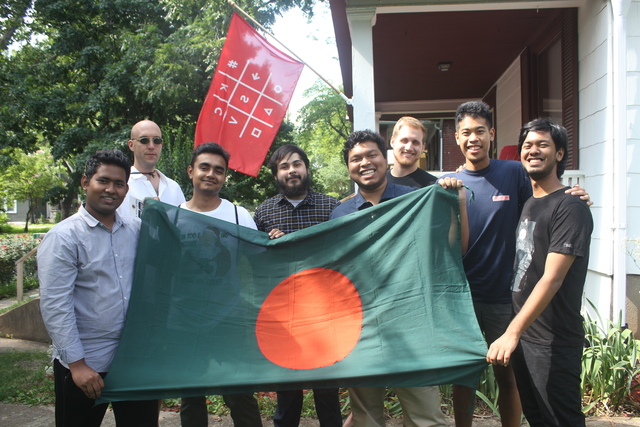
The Panacea team holding the Bangladeshi flag outside the GEW Startup House in KC’s Startup Village.
Last fall when Soumik Aswad applied for Global Entrepreneurship Week’s Startup Open, Kansas City was the last place he thought he’d end up.
But Aswad and his brother, Souvik, both Bangladeshi citizens, placed second in the global competition with their fledgling startup idea Panacea, a company focused on eliminating the counterfeit pharmaceutical problem plaguing their home country.
The prize? A three-month stay for two in the Kansas City Startup Village’s GEW Startup House.
In the end, Panacea beat out more than 400 competitors from 26 different countries for the chance to come to KC. The team was only able to stay for two weeks instead of three months, but Aswad says the experience was nothing short of wonderful.
“People are really close by (at KCSV) and when you’re close by a lot of things happen,” Panacea’s co-founder and CEO Aswad told SPN via Skype from his home in Bangladesh. “There’s a synergy there. Before, I’d heard that term used a lot, but that’s a word I really felt there.”
The Aswad brothers as well as a handful of their team members, who stayed at KCSV’s Home for Hackers, spent their two weeks in Kansas City exploring the city, meeting entrepreneurs and pitching at 1 Million Cups.
“We arrived and the next day we presented at 1 Million Cups, which got us introduced to a lot of people in the city,” Aswad said. “I don’t know how they get so much traction every Wednesday, but people really do make time to come to this event and it was really helpful for us.”
Aswad added that the creation of community in Kansas City, particularly around KCSV, is something that truly impressed him about his visit to the Midwest.
“The idea is to take international startups and the idea of Global Entrepreneurship Week and bring them to Kansas,” Aswad said. “Rather than some place more like Silicon Valley, [GEW] brings them to Kansas and gives a picture of an authentic startup scene in an authentic American place. It might not be as big as the Valley, but there’s still lots happening there.”
Making pharmaceuticals safe again
In fact, it’s in large part because of GEW’s Startup Open competition that the Aswad brothers finally took action on a lingering startup idea they’d had.
While Aswad says it’s sometimes difficult for American customers to understand the problem his company solves, in Bangladesh, India and Africa, Panacea serves an ever-increasing market.
Currently there’s an estimated $130 million worth of counterfeited pharmaceutical drugs in Bangladesh, meaning the packaging and appearance may look like your typical prescription but the pills themselves are fakes.
After a family member got sick from counterfeit drugs, the Aswads began seriously considering the idea of a solution that would help consumers verify the authenticity of their medications. So they turned to GEW.
“We had this idea and wanted to validate it outside of our personal experience,” Aswad said. “We wanted to test it so we decided to give it to an international organization like GEW, and the feedback was great. It was at that point in time that we started working on it and finding out if the tech was available, if it was scalable and economical.”
In Bangladesh, Aswad says anywhere between 5–10 percent of all medicine is fake. In India that number can be as high as 20 percent and in Africa, he estimates close to 40 percent of prescriptions are counterfeit.
Each strip of medication produced and sold by pharmaceutical companies has a unique code on the packaging that allows the producer to see when it’s been purchased and left the shelves. Panacea allows consumers to harness that information and verify their medication through their mobile phone. Using Panacea’s app, customers can scan a medicine’s unique serial number to sync information with the company producing it and verify its authenticity.
The startup hasn’t officially launched yet, but Aswad says they’re working with pharmaceutical companies to demo and test their product.
Read more about the GEW house in the KCSV through our previous coverage: “Former Kauffman fellow opens KCSV house to international entrepreneurs.”
Credits: Photos courtesy of Panacea.




